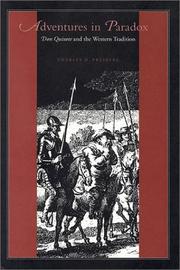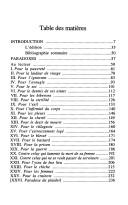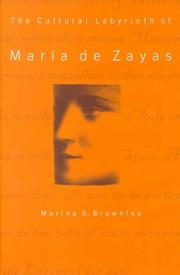| Listing 1 - 10 of 36 | << page >> |
Sort by
|

ISBN: 0271072237 9780271072234 0271020393 9780271020396 0271023643 9780271023649 Year: 2022 Publisher: University Park, PA
Abstract | Keywords | Export | Availability | Bookmark
 Loading...
Loading...Choose an application
- Reference Manager
- EndNote
- RefWorks (Direct export to RefWorks)
Cervantes’s Don Quixote confronts us with a series of enigmas that, over the centuries, have divided even its most expert readers: Does the text pursue a serious or comic purpose? Does it promote the truth of history and the untruth of fiction, or the truth of poetry and the fictiveness of truth itself? In a book that will revise the way we read and debate Don Quixote, Charles D. Presberg discusses the trope of paradox as a governing rhetorical strategy in this most canonical of Spanish literary texts. To situate Cervantes’s masterpiece within the centuries-long praxis of paradoxical discourse in the West, Presberg surveys its tradition in Classical Antiquity, the Middle Ages, and the European Renaissance. He outlines the development of paradoxy in the Spanish Renaissance, centering on works by Fernando de Rojas, Pero Mexía, and Antonio de Guevara. In his detailed reading of portions of Don Quixote, Presberg shows how Cervantes’s work enlarges the tradition of paradoxical discourse by imitating as well as transforming fictional and nonfictional models. He concludes that Cervantes’s seriocomic ";system"; of paradoxy jointly parodies, celebrates, and urges us to ponder the agency of discourse in the continued refashioning of knowledge, history, culture, and personal identity.This engaging book will be welcomed by literary scholars, Hispanisists, historians, and students of the history of rhetoric and poetics.
Paradox in literature. --- Paradoxes in literature --- Cervantes Saavedra, Miguel de,
Book
ISBN: 9780739171226 0739171224 9780739171219 0739171216 Year: 2012 Publisher: Lanham, Maryland : Lexington Books,
Abstract | Keywords | Export | Availability | Bookmark
 Loading...
Loading...Choose an application
- Reference Manager
- EndNote
- RefWorks (Direct export to RefWorks)
How do an author's techniques establish the recurring paradox raised by the tragic genre? I have called upon the valuable arguments offered by Plato, Aristotle, Hegel, and Nietzsche to help the student and lay reader understand the operation of basic literary languages. But fiction is not philosophy. My study focuses on the narrative sequence, im-ages, and rhetorical devices that embody a dilemma envisioned by prominent tragedians in both the ancient and modern worlds.
Tragedy --- Paradox in literature. --- Paradoxes in literature --- History and criticism.
Book
Year: 1973 Publisher: Paris : Larousse,
Abstract | Keywords | Export | Availability | Bookmark
 Loading...
Loading...Choose an application
- Reference Manager
- EndNote
- RefWorks (Direct export to RefWorks)
Women and literature --- Paradox in literature. --- History --- de La Fayette,

ISBN: 0271020393 0271072237 Year: 2001 Publisher: University Park, Pennsylvania : The Pennsylvania State University Press,
Abstract | Keywords | Export | Availability | Bookmark
 Loading...
Loading...Choose an application
- Reference Manager
- EndNote
- RefWorks (Direct export to RefWorks)
Cervantes’s Don Quixote confronts us with a series of enigmas that, over the centuries, have divided even its most expert readers: Does the text pursue a serious or comic purpose? Does it promote the truth of history and the untruth of fiction, or the truth of poetry and the fictiveness of truth itself? In a book that will revise the way we read and debate Don Quixote, Charles D. Presberg discusses the trope of paradox as a governing rhetorical strategy in this most canonical of Spanish literary texts. To situate Cervantes’s masterpiece within the centuries-long praxis of paradoxical discourse in the West, Presberg surveys its tradition in Classical Antiquity, the Middle Ages, and the European Renaissance. He outlines the development of paradoxy in the Spanish Renaissance, centering on works by Fernando de Rojas, Pero Mexía, and Antonio de Guevara. In his detailed reading of portions of Don Quixote, Presberg shows how Cervantes’s work enlarges the tradition of paradoxical discourse by imitating as well as transforming fictional and nonfictional models. He concludes that Cervantes’s seriocomic ";system"; of paradoxy jointly parodies, celebrates, and urges us to ponder the agency of discourse in the continued refashioning of knowledge, history, culture, and personal identity.This engaging book will be welcomed by literary scholars, Hispanisists, historians, and students of the history of rhetoric and poetics.

ISBN: 2600003010 9782600003018 Year: 1998 Volume: 498 Publisher: Genève: Droz,
Abstract | Keywords | Export | Availability | Bookmark
 Loading...
Loading...Choose an application
- Reference Manager
- EndNote
- RefWorks (Direct export to RefWorks)
French literature --- Paradox in literature --- Paradoxe dans la littérature --- Paradoxe dans la littérature
Book
ISBN: 9781618116321 1618116320 9781618116338 1618116339 1618119826 Year: 2017 Publisher: Boston, MA
Abstract | Keywords | Export | Availability | Bookmark
 Loading...
Loading...Choose an application
- Reference Manager
- EndNote
- RefWorks (Direct export to RefWorks)
This book explores the major paradoxes of Russian literature as a manifestation of both tragic and ironic contradictions of human nature and national character. Russian literature, from Pushkin and Gogol to Chekhov, Nabokov and to postmodernist writers, is studied as a holistic text that plays on the reversal of such opposites as being and nothingness, reality and simulation, and rationality and absurdity. The glorification of Mother Russia exposes her character as a witch; a little man is transformed into a Christ figure; consistent rationality betrays its inherent madness, and extreme verbosity produces the effect of silence. The greatest Russian writers were masters of spiritual self-denial and artistic self-destruction, which explains many paradoxes and unpredictable twists of Russian history up to our time.
Paradox in literature. --- Russian literature --- Russian literature. --- History and criticism. --- Paradoxes in literature
Book
ISBN: 1461914027 9781461914020 9781599731476 Year: 2011 Publisher: [Place of publication not identified] Il Produttore Casa Educativa
Abstract | Keywords | Export | Availability | Bookmark
 Loading...
Loading...Choose an application
- Reference Manager
- EndNote
- RefWorks (Direct export to RefWorks)
Paradox in literature --- English --- Languages & Literatures --- American Literature --- Paradoxes in literature
Book
ISBN: 1438467044 9781438467047 9781438467030 1438467036 1438467028 Year: 2018 Publisher: Albany, New York : SUNY Press,
Abstract | Keywords | Export | Availability | Bookmark
 Loading...
Loading...Choose an application
- Reference Manager
- EndNote
- RefWorks (Direct export to RefWorks)
With a career spanning more than fifty years as a writer, scholar, and public intellectual, Édouard Glissant produced an astonishingly wide range of work, including poems, novels, essays, pamphlets, and theater. In Think Like an Archipelago, Michael Wiedorn offers a fresh interpretation of Glissant's work as a cohesive and explicitly philosophical project, paying particular attention to the last two decades of his career, which have received much less attention in the English-speaking world despite their remarkable productivity. Focusing his study on the idea of paradox, Wiedorn argues that it is fundamental to Caribbean culture and thought, and at the heart of Glissant's philosophy.The question of difference has long played a central role in the literary and philosophical traditions of the West, however to think differently, Glissant suggests focusing elsewhere: on the post-plantation societies of the Caribbean, and the Americas more broadly. For Glissant, paradoxical lessons drawn from the natural and cultural realities of the Caribbean can point to new ways of thinking and being in the world: in other words, to the creation of what Glissant calls a "new category of literature," and in turn to the attainment of his utopian political vision. Thinking through such paradoxes, Wiedorn demonstrates, can offer new perspectives on the old questions of totality, alterity, teleology, and the potential of philosophy itself.
Paradox in literature. --- Contradiction in literature. --- Paradoxes in literature --- Glissant, Édouard,
Book
Year: 1914 Publisher: Tübingen : Druck von H. Laupp,
Abstract | Keywords | Export | Availability | Bookmark
 Loading...
Loading...Choose an application
- Reference Manager
- EndNote
- RefWorks (Direct export to RefWorks)
Criticism and interpretation. --- Paradox in literature. --- Paradoxe dans la littérature. --- Paradoxen. --- Hebbel, Friedrich, --- Dramatic works.

ISBN: 0812235371 1512807125 Year: 2000 Publisher: Philadelphia (Pa.): University of Pennsylvania Press
Abstract | Keywords | Export | Availability | Bookmark
 Loading...
Loading...Choose an application
- Reference Manager
- EndNote
- RefWorks (Direct export to RefWorks)
Paradox in literature --- Zayas y Sotomayor, María de, --- Literary style.
| Listing 1 - 10 of 36 | << page >> |
Sort by
|

 Search
Search Feedback
Feedback About UniCat
About UniCat  Help
Help News
News